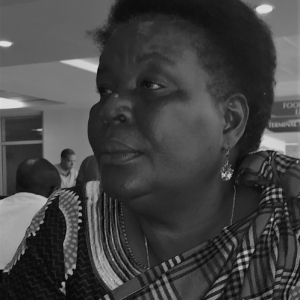Project Description
NiketchePaulina Chiziane
Mozambique
Paulina Chiziane, born in 1955, grew up in a non-assimilated home where contact with the white colonial masters was strictly forbidden. She married early, but separated in her mid-twenties in order to study and devote herself to her work as an author. She has since become regarded as one of her country’s most important authors. Although she is the first woman to have published a novel in Mozambique, she prefers to consider herself a storyteller, who bases her work on the rich heritage of the oral tradition. In 2021, she won the Camões Prize, the world’s most important distinction in the Portuguese language.
 © Private
© Private//
The Joyful Song of the Partridge
After the huge success of Niketche, Chiziane has now written The Joyful Song of the Partridge (“O Alegre Canto da Perdiz“), her fifth novel. Niketche dealt with the phenomenon of polygamy – the heroine discovers that her husband has more wives and families – whereas with The Joyful Song of the Partridge, Chiziane sheds light on the role of African women in the colonisation process. At the heart of the novel is the beautiful Delfina, who leaves her poor black husband and marries an affluent white man. Her aim is to bear children with lighter skin, thereby making it possible for them to have a better life. She is racist in her dealings with her own children, for example giving her firstborn black children worse food than the younger mixed-race children, and in so doing destroys her family and spirals herself into despair. Only decades later does she find her children and grandchildren, and particularly her daughter Maria das Dores, whom she thought had disappeared for good.
The story takes place in the Northern province of Zambézia, and is told looking back from the present day. The action takes place thirty years previously, still during the colonial times. Social problems, however, are not just down to colonisation alone, but also caused by the patriarchal structure which is increasingly evoked in myths tradition-conscious population. Instead of arguing the purity of black or white, Chiziane postulates on the affirmation of society’s mixture culture and an active adoption of the Portuguese language. As in earlier books, this author guides her readers through a world of traditional values and paints the captivating portrait of a collapsing society. Without using the methods of magical realism, she mixes mythical with real events and thereby creates a powerful, outlandish and incomparable work of poetic literature.
//
Niketche
In 2002, Chiziane published her fourth novel, Niketche (Niketche is the name of an erotic love dance). Rami has been married to Tony, a senior police officer, for twenty years and they have several children. Her nightmare begins when she discovers that she has been sharing her husband with other women and their families. She subsequently tries feverishly to get to know these women and in doing so experiences to her great pain what it means to come up against ancient habits and customs and the enormous gulf between North and South in her country.
What do monogamy and polygamy mean? Are they products of culture, institutionalisation, hypocrisy, indolence or convention, or is it a matter of a person’s nature, intellect or emotions whether he or she adopts the one or other lifestyle?
Like in her former novels, the author leads her readers adeptly through a world of traditional values, drawing an exciting, compelling and also a humorous portrait of a society in the process of change.
RIGHTS
NOVELS
The Joyful Song of the Partridge (“O Alegre Canto da Perdiz”)
Lisbon: Caminho 2008, 336 p., 2016, 384 p.
Colombia: Taller de Edición Rocca 2018 · Cuba: Oriente 2011 · France: Projectiles · Italy: La Nuova Frontiera 2010 · Mexico: Elefanta del Sur 2020 · USA: Archipelago 2024
The First Wife: A Tale of Polygamy (“Niketche. Uma História de Poligamia”)
Lisbon: Caminho, 2002, 336 p.
Brazil: Companhia das Letras 2004, 2022 · Colombia: Uniandes 2019 · Croatia: Meandar 2013 · Egypt: Sphinx Agency (worldwide) · France: Actes Sud 2006 · Greece: Kastaniotis · India: Jadavpur University 2023 · Italy: La Nuova Frontiera 2004, 2023 · Serbia: Geopoetika 2014 · Slovakia: Portugalsky 2021 · Spain: Cobre 2004 · Thailand: Library House · UK: Aflame Books 2011 · USA: Archipelago Books 2016
The Seventh Oath (“O Sétimo Juramento”)
Lisbon: Caminho 2001, 268 p.
Argentina: La Gran Nilson · Germany: Brandes & Apsel 2002 · Italy: La Nuova Frontiera 2002 · Spain: Takusan 2008 (Spain only) · USA: Archipelago
Winds of Apocalypse (“Ventos do Apocalipse”)
Lisbon: Caminho 1999, 278 p.
Dutch sample translation available
Argentina: La Gran Nilson · Germany: Brandes & Apsel 1997 · France: Projectiles · Spain: Txalaparta 2002
Love Ballad in the Wind (“Balada de Amor ao Vento”)
Colecção Karingana 1999, 117 p.
Brazil: Companhia das Letras 2022 · France: Projectiles · Germany: Brandes & Apsel 2001 · Italy: Urogallo 2017 · Mexico: Elefanta (Worldwide, excl. Argentina) · Sweden: Gleerups (Excerpt) 2017
PARTICIPATION IN ANTHOLOGIES
Novel of the World
Italy: Fondazione Arnoldo e Alberto Mondadori 2015
Represented for Caminho, Portugal

